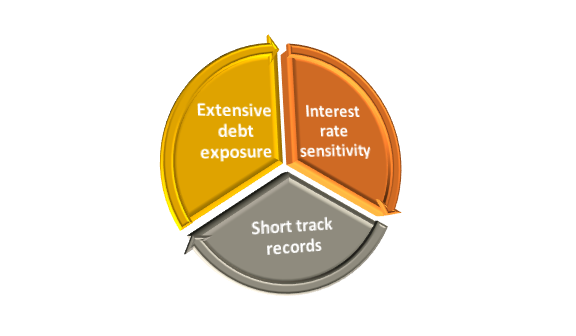What is a business development company?
A closed-end investment business is referred to as a business development company (BDC). Its goal is to invest in mid and small-sized enterprises and distressed firms.
Smaller businesses might employ BDCs to get the financing they want for expansion that they wouldn't get anywhere else. BDCs aid struggling enterprises in regaining economic stability.
On the other hand, these firms are typically young businesses, organisations experiencing or have emerged from financial hardship, or businesses looking for capital. In addition, the BDC is responsible for providing managerial support to the firms in its portfolio.
Explaining the term BDC
Investors in BDCs are typically searching for high dividend yields or an alternate investment vehicle to exchange-traded funds (ETFs) and mutual funds. BDCs are a wise investment, but they might not be for everybody.
BDC investors should learn how they work, like with any investment, and determine whether their unique attributes meet their risk tolerance and targets.
Furthermore, a BDC aids medium and small-sized businesses in their early stages of development. Many BDCs are publicly traded firms whose stocks trade on significant stock exchanges like the Nasdaq, American Stock Exchange (AMEX) and are structured similarly to closed-end investment funds. They may be a high-risk investment, but they pay out significant dividend returns.
BDCs are appealing because they are accessible to practically everyone. In the same way that private equity funds and venture capital do, BDCs are designed to create capital gains and revenue when the businesses they participate in are sold.
Investors are having difficulty finding current income for their investment portfolios in today's historic low-interest rate climate. Therefore, BDCs were considered as a potential source of additional revenue and diversification.
Non-accredited investors wishing to invest in startups are typically BDC investors. These investors gain access to private enterprises and select companies by investing in BDC.
Private companies are usually challenging to invest in, but BDCs offer investors a platform to do so. BDCs make investments in illiquid assets. Around 90% of a BDC's profit must be allocated to its shareholders, who are also its investors. BDCs have a high dividend yield; that is why they are fascinating to investors.
What distinguishes them is that investors could purchase the stock of BDCs on the open market and participate in the formerly inaccessible realm of venture capital.
When looking for a prospective small business, a BDC does not invest in just any firm; instead, it invests in and advises firms that can grow large in the future. BDCs also hunt for businesses to exercise significant control over the company's direction, such as by holding board seats or just giving consulting services. BDCs anticipate that the value of their investments will rise as the business grows. BDCs also lend money to small businesses and offer consulting services for a fee.
Summary
- Smaller businesses might employ BDCs to get the financing they want for expansion that they wouldn't get anywhere else.
- Investors in BDCs are typically searching for high dividend yields or an alternate investment vehicle to exchange-traded funds (ETFs) and mutual funds.
- In the same way that private equity funds and venture capital do, BDCs are designed to create capital gains and revenue when the businesses they participate in are sold.
Frequently Asked Questions (FAQs)
What constitutes a business development company?
BDCs do not provide finance to all small and medium-sized businesses in the United States. These enterprises must meet specific criteria to obtain money from BDCs. The following are the criteria for qualification fairness.

Source: © Alexandersikov | Megapixl.com
- The firm must be a domestic corporation or have its domicile in the region.
- The Securities and Exchange Commission must be notified of the firm's existence.
- BDCs are available to domestic businesses in severe need of funds.
- BDCs could give public or private enterprises a market value of less than $250 million. BDC may invest at least 70% of its holdings in such companies.
What are the benefits of investing in a BDC?
There are several benefits to working with a business development firm. The following is a list of all the benefits of investing in a BDC.
Enhanced liquidity
If retail investors find ways to participate in private firms, they face a different challenge: getting their money out.
Non-publicly traded firms are, in general, illiquid investments. So, if you're in a tight spot, there is a need to wait long for a liquidation event or on the secondary market, you'll have to sell at a loss.
BDCs that are publicly listed offer high liquidity and prevent your money from being locked up for long periods.
Source: Copyright © 2021 Kalkine Media
Private-sector access
Regular investors would otherwise be unable to access private market investments, which are either unavailable or difficult to obtain. BDCs give investors simple access to a potentially lucrative market segment that would otherwise be difficult to access.

Source: © Ekkasit919 | Megapixl.com
More transparency
BDCs, like highly regulated public corporations, are legally required to give detailed financial information to their investors. However, private firms are not obliged to disclose much information about their finances to their direct investors. This ensures that money is spent wisely when investing.
What are the risks of investing in BDC?
BDCs provide a lot of benefits, but they also have a lot of drawbacks. The following is a list of the risks linked with investing in a BDC.
Extensive debt exposure
When it comes to investing in their portfolio firms, BDCs rely mainly on debt because they are often privately owned or thinly traded, making them primarily illiquid. Moreover, the economic catastrophe we have experienced due to the Covid-19 outbreak may compel portfolio enterprises to cease operations and eventually default on their loans.

Source: Copyright © 2021 Kalkine Media
Short track records
Even though the BDC format was created in the 1980s, the vast majority have only been around since the early 2000s. As a result, their track records are still short, offering potential investors little information to consider when analysing their options.
Interest rate sensitivity
Interest rate hikes can make borrowing money more costly for BDCs, reducing their profit margins and restricting their investment ability.
 Please wait processing your request...
Please wait processing your request...